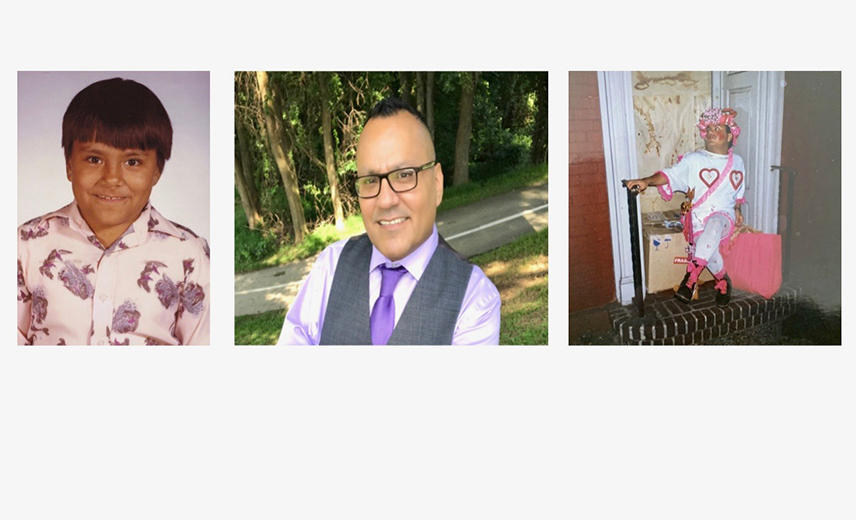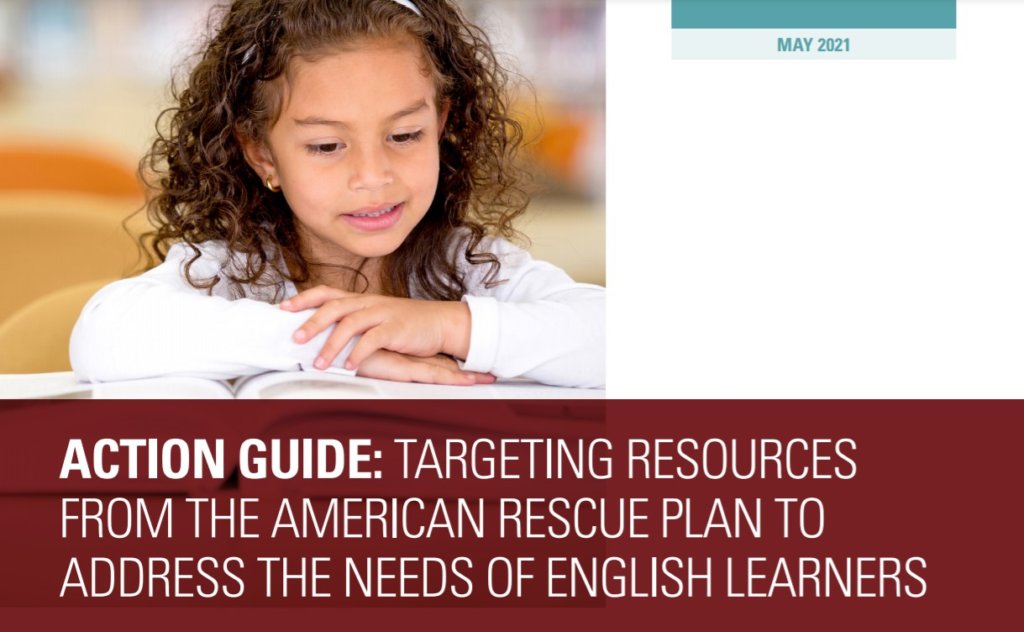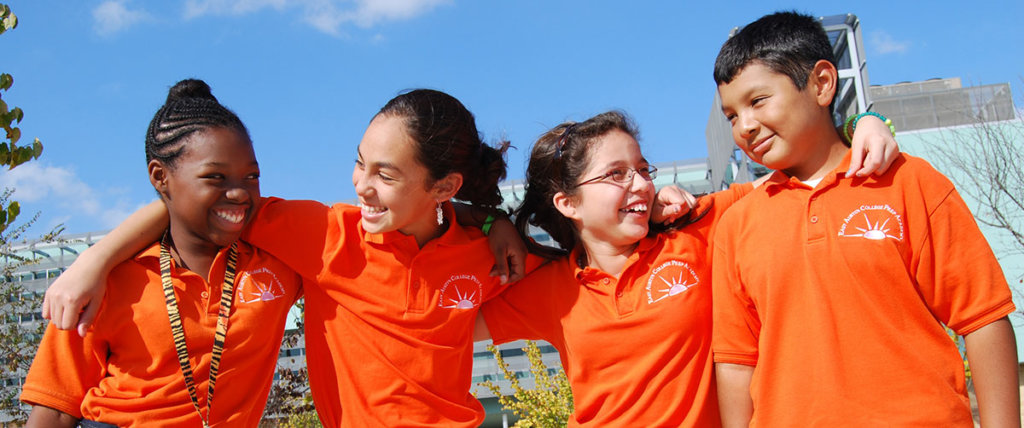Mi Testimonio:
Confessions of a Queer,
Chicano, Spanglish-Speaking Educational Leader

Translanguaging, the process of integrating different languages as a form of communication among multilingual learners is becoming more widely understood in the Department of Education as an important skill not just for learning a second language, but for helping students integrate their full identities into a classroom or a community. In fact, discussions of translanguaging were integral to a recent Office of English Language Acquisition webinar on culturally responsive school practices to help Latinx children, many of whom are dual-language learners. These conversations are likely to grow as the Biden Administration is expected to usher in a more inclusive era in public schooling. To understand these issues better, ProgressReport.co caught up with an expert who’s been practicing and promoting translanguaging long before it gained so much official attention.
The following guest commentary comes from Dr. José Medina, a dual-language researcher, expert, and advocate who co-authored the widely used Guiding Principles for Dual Language Education: Third Edition, used throughout the United States and internationally to implement and continuously improve dual language programming. Dr. Medina is also the author of several bilingual poetry books for children and adults harnessing personal testimony, or testimonios. The books can be found at www.velazquezpress.com/jm. You can also follow him on Instagram and TikTok @josemedina1000 or on Twitter @josemedinajr89. —ProgressReport.co
First things first. Please understand that I am able to leverage my entire linguistic repertoire and solely mobilize English as I write. También puedo escribir completamente en español porque tengo la destreza de lectoescritura en ambos idiomas. Translanguaging research returns the power to the individual, and for comunidades multilingües, this means yielding our idiolect as we see fit. But, today, I choose to disrupt this space and write en inglés y español because I can. Without italics, without nada that will make the reader feel comfort, I write in both porque esto es lo natural for bilingual communities even if it is discouraged in schools and academia. Hold on and remain calm because this is what equidad lingüística looks like and feels like.
In my role as founder and Chief Educational Advocate for Dr. José Medina: Educational Solutions, I am privileged to serve in escuelas and distritos escolares alrededor del world. But, I also have to admitir que soy un desmadre. I am a mess. We are all a mess. As human beings, we are a big mess. As educadores, we are a hot mess. But often, we are afraid to let anyone know that somos un big, beautiful, imperfect, striving-to-be- better-pero-a-veces-falling-short, sublime mess.
Without admitting that we are all biased and prejudiced, the privilegio and/or privileges that we enter any space with, cannot be used to dismantle the sistemas that oppress certain student communities. It is for this reason that cada PK-12 estudiante must engage in the ongoing and never-ending work of anti-bias and anti-racism (ABAR). Thus, esto dicta that every educator must also be engaged in this critical work. And – it all begins with critical self-reflección. It begins with our personal testimonio. By engaging in testimonio work, comunidades educacionales – to include students, educators, and families – can set the foundation for ongoing and unending ABAR work.
In Key Concepts in Intercultural Dialogue, Mora (2015) explica that testimonio, a witness account, embodies a narrative research methodology rooted en historia latinoamericana, against the backdrop of social inequity that has plagued the region por décadas.. For us in education, via a first-person account of the individual who faced opresión y marginación, , it is possible to make conexiones that lead to dismantling the systems of oppression that exist in all schools and districts. In short, testimonio work becomes the key to ensure que cada estudiante, cada educator is working to decolonize, or rather to indigenize, comunidades de educación.
So, let us begin. I confess, soy un queer, Chicano, Spanglish-speaking educational leader who works cada día to openly disrupt sistemas que siguen oprimiendo a Black, Queer, Indigenous, Communities of Color y a personas que lingüísticamente don’t align with the flawed English-centric lens that is prevalent in U.S. schools.
This is my testimonio.
I have always felt like el otro…the other.
It started on the first day of school cuando my Spanish language was gagged by the systemic racism that exists in escuelas en este país, even today.
I now write in inglés y español without the shame that I have been made to feel por tanto tiempo.
Escribo en los dos idiomas because I am not more of one, than the other language. Soy los dos at the same time.
Otro. Always other. Qué desmadre.
The nombres that I have so often been called durante toda mi vida reinforced that.
Wetback.
Joto.
Beaner.
Gordo.
Faggot.
Vendido.
White Wannabe.
Creído.
Brown Trash.
Pocho.
But it is also these labels that have made me la persona que hoy soy.
Son las cosas que me hicieron motivated to achieve what some thought no era posible.
These names that have followed me into adulthood like tattoos that cannot be removed, have forced me to rebel and luchar and rage and llorar and continue to fight for what is just and fair.
The Testimonio Framework was conceptualizado by our team, grounded in the work of Paulo Freire y Pedagogía del oprimido, as a way to embed this importante work into all comunidades de educación. These include monolingual, bilingual, and dual language classrooms, where los educadores, estudiantes y familias are allowed to take space in school buildings that often have served to embed monocultural, monolingual, heteronormative, patriarchal, and xenophobic interests more deeply into a tapestry of oppression.
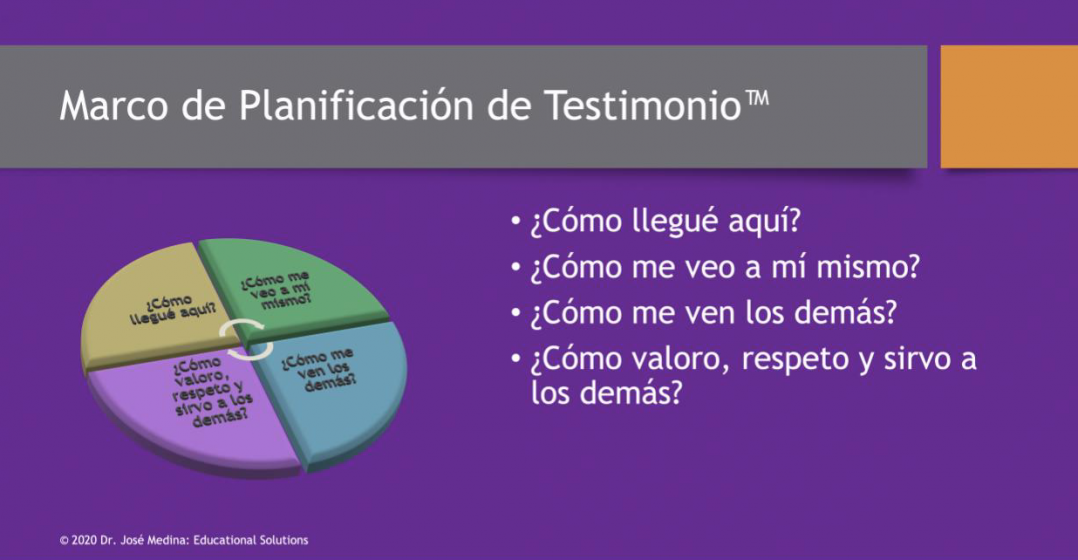
Via the use of the four components/questions included in the Marco de planificación de testimonio (see image below), los estudiantes mejor pueden ser owners of their full identity. In doing so, we empower them to embrace their entire repertorios lingüísticos without apology. Children can leverage their idiolect as they mobilize each language independientemente o cuando they choose to, combine language features from different nation languages al mismo tiempo. Equally important, students begin to understand that they are power, belleza, culture, y tradición – and that their duty as human beings is to use whatever privilegio they have to serve others.
From the moment that my first-grade teacher changed my name from José to Joe so that I could más rapidamente become American, I understood that I needed to be something else, someone other than myself, to make it in school.
I hate to admit that once upon a time, as a young child en la escuela, I hated myself for being Brown and yearned to be White.
I dreamed of being Americano, speaking English fluently and having padres that spoke English instead of español.
I am not solely responsible for these feelings. The mundo around me, both in and out of la escuela, led me to feel that I was not enough.
There are estudiantes in every classroom right now, virtual or in person, that don’t feel like they are enough.
So, I choose action. I choose activismo.
But as I do, I have to also acknowledge that I am privileged.
As a queer man in this country, I have to acknowledge that it is la verdad.
Hasta con mis sentimientos de other, I write this testimonio typing from my beautiful home, con mi computadora de la última, with a doctoral degree in hand that is so important to others but makes me feel cómo que cada día estoy más lejos from my childhood in El Paso/Juárez.
Testimonio, as a research methodology, y también, as an instructional strategy that is a part of inclusive PK-12 instrucción, creates educational spaces where students’ and families’ lived experiencias more readily allow us to question poder institucional and begin the arduous work of equidad and social justice. The Testimonio Framework provides a concrete way to begin este trabajo. It gives educational leaders una manera de tomar that first step in dismantling antiquated systems de educación.
This work does not happen by chance. Tenemos que inculcarlo into our lessons, use it to create curriculum materials que son más inclusivos, and to change our practices de instrucción that cradle English-only ideologies as a way to support culturally destructive ideologies. This is our duty as educadores. It is not an opción. The time is now.
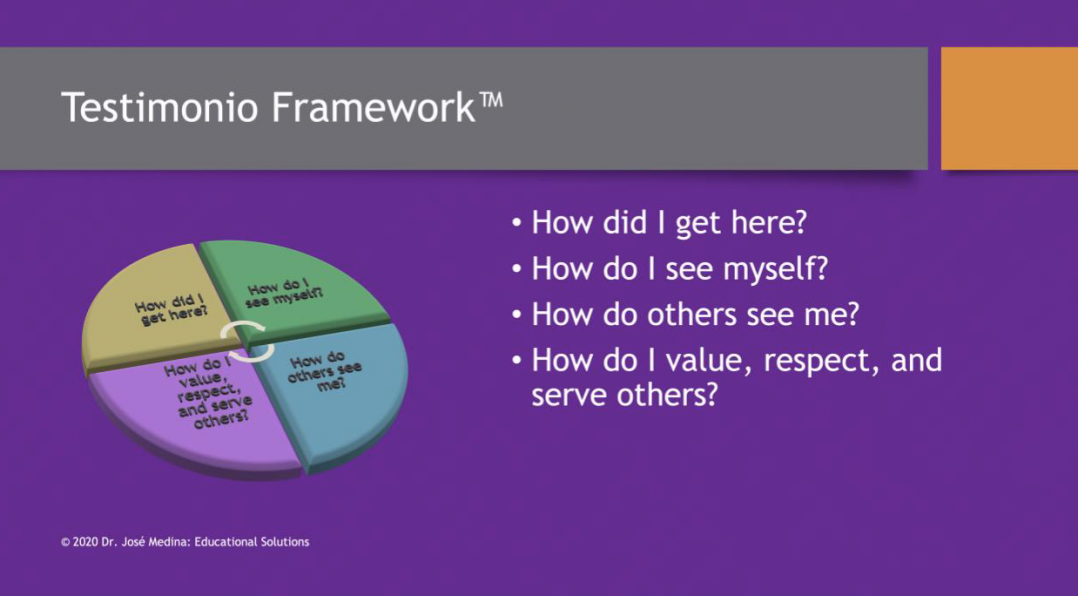
With privilegio comes duty. Comes a call to civil disobedience.
Es el hablar sin temor de lastimar, but it is also about engaging in conversations that are moving all of us forward without hatred.
It is about tackling injustice and bias head on without stepping on those that are en nuestro camino.
It is about grace and caridad, pero con propósito y fuerza para algún día, finally get closer to equity.
I have been given una plataforma where I am able to reach educatores, familias, estudiantes, and communidades all over this country and the world.
The conversations begin here. One person at a time.
Change happens una conversación at a time.
Today y siempre, yo lucho.
Lucho por my parents que no hablan inglés and are US citizens.
Lucho por my family that loves me despite my many faults.
Lucho por my husband because in the eyes of some, we are still deemed perverts for loving one another.
Lucho por mis tíos y tías y cousins que viven in this country, con y sin documentos because we all have the same dreams.
Lucho por the LGBTQ+ community, especially the youth trying to survive in school each day.
Lucho por all of the beautiful Spanglish speakers whose multilingüismo continues to be seen as a threat in many U.S. classrooms.
Lucho por todas las educational communities that I am blessed to serve.
Lucho por todos the educators, students y families who feel like the otro.
Other.
This is my testimonio. It guides mi trabajo as a queer, Chicano, Spanglish-speaking educational leader. It inspires my work as a language researcher who provides technical assistance, professional development, and job-embedded coaching to schools and districts throughout los Estados Unidos and internationally. My testimonio is also the driving force as I deliver keynote addresses before those seeking to better serve estudiantes y sus familias.
Embracing my full identidad also empowers me to challenge you, the reader y preguntarle…what will you do now to ensure that this trabajo continues? Here are some posibilidades:
- As human beings, aceptamos que todos tenemos biases and prejudices and that our sistema de educación is a product of these culturally destructive ideologies.
- As teachers, entendemos that con cada lección that we plan, we either chip away at systems of oppression or los mantenemos.
- As school leaders, reconocemos that if we are not líderes de instrucción who model this trabajo tan importante, we are but building managers.
- As district administrators, escribimos into policy, sístemas that protect culturally and linguistically diverse comunidades estudiantiles.
- As state and national policy makers, including the incoming U.S. Secretary of Education, abogamos, without apology, through a culturally sustaining lens and align with prácticas pedagógicas that actually value todos los estudiantes and not only those that fit into a White, monocultural, monolingüe, heteronormative, y patriarchal way of teaching and learning.
I confess. Each day as I wake up, I remind myself of my propósito. My job is to cause desmadre in the name of equidad and social justice. Entonces, ¿qué dices? Are you in?


